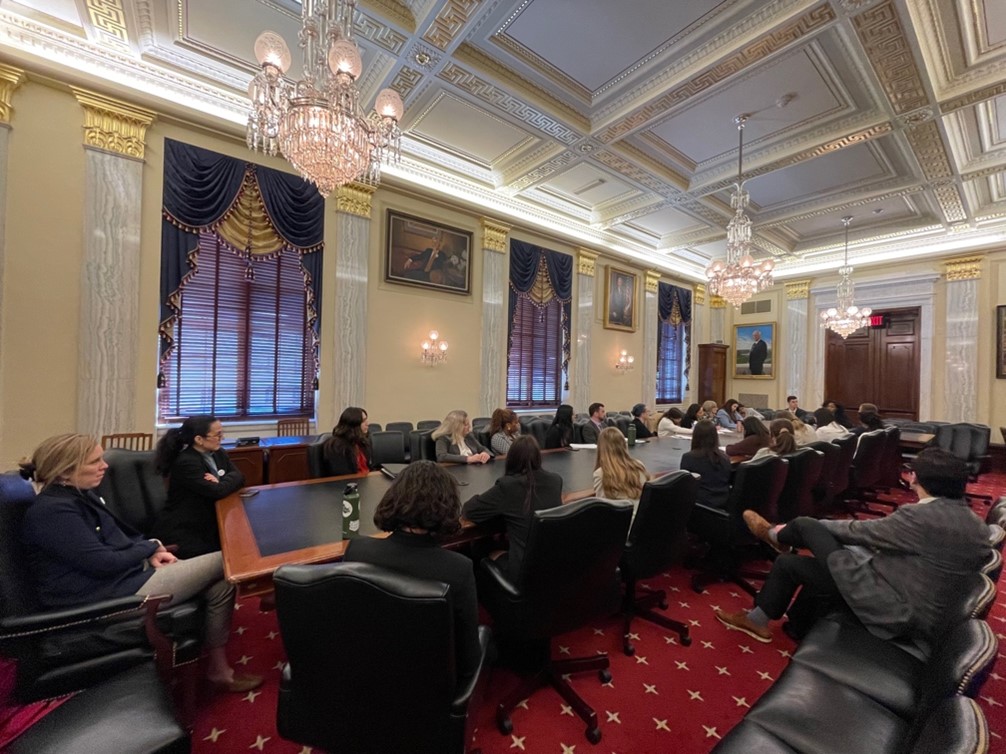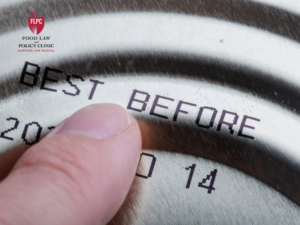By Caitlin Colangelo, FLPC 2L Student
On March 19-20, 2024, I attended a Fly-In advocacy event with the Zero Food Waste Coalition (ZFWC) in Washington, DC with another clinical student and a clinic fellow. The goal of the ZFWC is to build momentum on food waste reduction policies through partnerships between similarly minded groups. This was the first in-person ZFWC event since its founding. Today, there are more than 170 members across more than 40 states in the ZFWC. I was impressed to learn that the ZFWC has grown rapidly since its founding in 2020. In 2020, the coalition was composed of four members: Natural Resources Defense Council (NRDC), World Wildlife Fund (WWF), ReFED, and the Harvard Law School Food Law and Policy Clinic (FLPC). It was really fun to get to know representatives from companies I had already heard of, like Too Good to Go, and also to get to know representatives from organizations that were new to me, like Flash Foods.
On March 19, we started with a morning breakfast briefing at the NRDC headquarters. Here, we discussed advocacy dos and don’ts, the hill meeting format, and political sensitivities over breakfast catered by Tatte. We received materials to bring with us to the meetings, including talking points and leave-behind sheets for the staffers. I drafted the talking points document the week before our trip, so it was exciting to see the ZFWC members use it. Then, we broke out into our small groups and traveled to Capitol Hill for our Congressional and Senate meetings. I had never been to the House or Senate buildings before. I wasn’t expecting them to be so far apart, but my group definitely got their steps in.

My group had 10 meetings over two days. Some of my group members included Zoe Brookes and Michaela Tosone. Michaela was from the app FlashFood, which discounts food from grocery stores which is about to expire at a rate of 50% off. Zoe was from an organization called Share My Meals, which works to recover cooked meals from corporations and deliver them to people in need. I enjoyed meeting people concerned with the issue of food waste. It was also very informative to learn how the lobbying process operated, because this was my first time participating in a Fly-In. The meetings with staffers were more informal than I would have expected, but it was exciting that most staffers were very receptive to the bills.
We met with both democratic and republican congressional staff from a variety of states including Texas, New York, Minnesota, Colorado, and New Jersey. Before each meeting, we were sure to read about the background of the congressperson and prime ourselves on which ZFWC members operated in the jurisdiction. Each office was decorated differently depending on the senators’ home state. Overall, the staffers were receptive to the information we spoke about. This did not surprise me. The Food Date Labeling Act is a bipartisan bill, and it is difficult to be pro food waste. Staffers usually perked up when we said that the Food Date Labeling Act had a congressional budget score of zero.
In our meetings, we would start off by introducing the ZFWC including how it got started and its goals. Then we would introduce the issue of food waste. Our level of detail on this topic depended on the staffer’s self-described familiarity with it. Some of the statistics we shared were very compelling, including that if food waste were a country, it would be the third largest greenhouse gas emitter after China and the U.S. Finally, we would discuss the two marker bills: the Food Date Labeling Act and the No Time to Waste Act.
My role in these conversations was introducing each of these bills. After I gave an overview, my groupmates would fill in the gaps with their expertise and experiences in their organizations. I thought it was impactful when they shared how much food their organization had saved from landfills. Both Flash Food and Share My Meals are currently operating on a relatively small scale, but it was incredible to hear how much of an impact they already are having. This seemed persuasive to the staffers because it revealed that the work from these organizations is scalable. Flash Food and Share My Meals both show that minimizing food loss and waste is possible just by bridging the gap between the food producer and the consumer.
I found that over time, I became increasingly comfortable speaking about these bills. Essentially, the Food Date Labeling Act would create a federal law to standardize food date labeling in the United States. It would simplify the current mess of date labels including best by, best before, freshest on, etc. in favor of a two-label system: either “BEST If Used By” for quality or “USE By” for a safety date. This would significantly reduce consumer confusion, and in turn, reduce food waste. We made sure to note that the FDLA would include consumer education to clarify what the new date label system means. We also presented some basic information about the No Time to Waste Act. At the very end of the meeting, we discussed appropriations for FY2025 with the staffers.
After participating in a Fly-In, I realized that the leave-behind materials are very important. Each staffer was extremely busy and seemed to have dozens of meetings around the clock. Leaving behind simple but comprehensive materials that explained the bills was very important because the staffers were going to look back at the material to jog their memories on our conversation. If I ever go to a Hill day again, I think I would walk staffers through the leave behind materials throughout our meeting, so that when they looked back at them, it jogged their memory more directly on our conversation.
Overall, I am very grateful to have been able to attend the Fly-In. It was a great opportunity to learn about the lobbying process and work with tons of food rescue organizations from across the country. It was exciting to see how much the ZFWC has grown in the past year and inspiring to note the impact of ZFWC advocacy on food waste policies.

Health Law & Policy, Commentary
Cuts to the Federal Workforce and Medicaid: What’s Happening and What Can Advocates Do? – Health Care in Motion
March 12, 2025